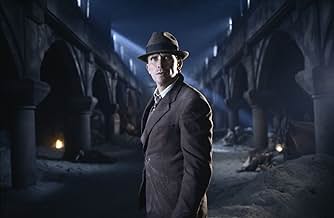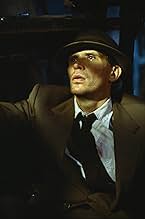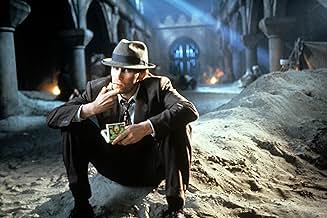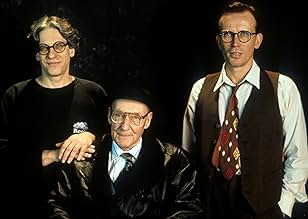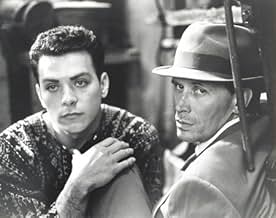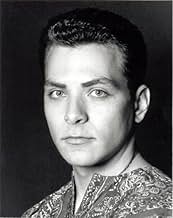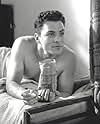Dopo aver sviluppato una dipendenza dalla sostanza che usa per uccidere gli insetti, uno sterminatore uccide accidentalmente la moglie e viene coinvolto in un complotto segreto del governo o... Leggi tuttoDopo aver sviluppato una dipendenza dalla sostanza che usa per uccidere gli insetti, uno sterminatore uccide accidentalmente la moglie e viene coinvolto in un complotto segreto del governo orchestrato da insetti giganti.Dopo aver sviluppato una dipendenza dalla sostanza che usa per uccidere gli insetti, uno sterminatore uccide accidentalmente la moglie e viene coinvolto in un complotto segreto del governo orchestrato da insetti giganti.
- Regia
- Sceneggiatura
- Star
- Premi
- 13 vittorie e 17 candidature totali
Joseph Scoren
- Kiki
- (as Joseph Scorsiani)
Louis Ferreira
- Exterminator #3
- (as Justin Louis)
Recensioni in evidenza
In common with the writings of Burroughs this is innovative, inspiring and yet difficult. Difficult both to relate to and to fully sympathise, never mind the narrative flow that may or may not be there. I have to say the picture quality on my Blu-ray was stunning and once I had managed to remove the German subtitles as much a joy to watch as it was to listen to the wonderful soundtrack. It is just that this is so very strange and uncompromising in its celebration of homosexuality and drug taking that it can be an effort to stay with it. it was just about the only Cronenberg I had not seen and it was interesting to see, instead of machines and mechanisms merging into man, this was the other way around with machines becoming squishy. The animatronics were impressive and although the final set piece didn't work so well, the whole thing was well managed and I just wish I could have been more on board.
Films about writers and the creative process are not generally action-packed, but this unusual piece has plenty of incident. The action takes place largely inside the mind of "William Lee" (William S. Burroughs) whose first book "Junkie: Confessions of an Unredeemed Drug Addict" dealt with his struggle against heroin addiction. "The Naked Lunch", set in the early 1950s, could be described as telling how that book came to be written. Lee does it tough. After "drying out" he has a job as a pest exterminator, killing cockroaches with powder from a cannister. He discovers that his wife Joan, still an addict, is shooting up with the bug powder and having sex openly with two of his literary friends, Hank and Martin. He then manages to kill her accidentally with his pistol ("I guess it's about time for our William Tell routine"). He flees the country and washes up in "Interzone" (Tangier - then an "international" city).
He tries to write but suffers from frequent hallucinations. He imagines his typewriter is a giant speaking bug whose mission is to act as his "Interzone" spyforce controller. He becomes involved with another expatriate literary couple, Tom and Joan Frost, and imagines that Tom is trying to kill his wife. Naturally he seduces the wife. Then he discovers he has a taste for gay sex, very easily indulged in locally, where there is a gorgeous willing boy such as Kiki ready to slide off the nearest bar stool. There is competition though from various other slimy types, including a rich gay predatory Swiss expatriate, Yves.
Somehow, the book gets written, and Hank and Martin show up just as Lee bottoms out in psychotic despair. They help him piece it together and head off back to New York, leaving Lee to "Interzone" and his hallucinations.
It takes a bit of discipline to watch this film - never has the creative process looked quite so destructive of the writer. Yet the whole thing has a lightness of touch about it. Lee never quite goes right over the edge and is able to observe himself with a certain amount of ironic detachment. At the same time, it is clear that the death of his wife has affected him deeply, both in terms of loss and guilt. The typewriter bugs are a cute touch. Burroughs was the grandson of the founder of the Burroughs office machinery empire, the man who patented the first practical adding machine - the mechanical bug runs in the family it seems. Abusive psychiatry also gets a send up.
As Lee, Peter Weller has a face as impassive as a homicide cop almost regardless of the turmoil within (after all, he made the role of Robocop his own). But he is a "tough guy" on the point of melt-down. Judy Davis, looking just right, plays with plenty of conviction both Joans (who in Lee's fevered brain are the same person). Ian Holm is good as Tom, the nasty older writer who is quite happy to lend his wife for sexual purposes but woe betide the man who damages his precious Arabic typewriter. Julian Peters as Yves radiated menace but overall was a bit of a cardboard-cutout, not helped by his dress and appearance, which seemed to have come straight from "Brideshead Revisited" (Sebastian in Morocco).
David Cronenberg as a director has certainly got a reputation for weird films ("The Fly", "Crash") but this offering is relatively restrained It was something of a pity that "Interzone" was a studio set somewhere (Canada?) but this is low-budget stuff after all. Unlike the bugs in "Fear and Loathing in Las Vegas", these ones have a story to tell, though it's a painful one. Like Hunter Thompson, Burroughs was a great prose writer and the film has plenty of good lines. No-one could view heroin addiction with equanimity after seeing this film, but there is no moralising. As bug agent Clark Nova put it in the film:
"Just remember this. All agents defect, and all resisters sell out. That's the sad truth, Bill. And a writer? A writer lives the sad truth like anyone else. The only difference is, he files a report on it."
He tries to write but suffers from frequent hallucinations. He imagines his typewriter is a giant speaking bug whose mission is to act as his "Interzone" spyforce controller. He becomes involved with another expatriate literary couple, Tom and Joan Frost, and imagines that Tom is trying to kill his wife. Naturally he seduces the wife. Then he discovers he has a taste for gay sex, very easily indulged in locally, where there is a gorgeous willing boy such as Kiki ready to slide off the nearest bar stool. There is competition though from various other slimy types, including a rich gay predatory Swiss expatriate, Yves.
Somehow, the book gets written, and Hank and Martin show up just as Lee bottoms out in psychotic despair. They help him piece it together and head off back to New York, leaving Lee to "Interzone" and his hallucinations.
It takes a bit of discipline to watch this film - never has the creative process looked quite so destructive of the writer. Yet the whole thing has a lightness of touch about it. Lee never quite goes right over the edge and is able to observe himself with a certain amount of ironic detachment. At the same time, it is clear that the death of his wife has affected him deeply, both in terms of loss and guilt. The typewriter bugs are a cute touch. Burroughs was the grandson of the founder of the Burroughs office machinery empire, the man who patented the first practical adding machine - the mechanical bug runs in the family it seems. Abusive psychiatry also gets a send up.
As Lee, Peter Weller has a face as impassive as a homicide cop almost regardless of the turmoil within (after all, he made the role of Robocop his own). But he is a "tough guy" on the point of melt-down. Judy Davis, looking just right, plays with plenty of conviction both Joans (who in Lee's fevered brain are the same person). Ian Holm is good as Tom, the nasty older writer who is quite happy to lend his wife for sexual purposes but woe betide the man who damages his precious Arabic typewriter. Julian Peters as Yves radiated menace but overall was a bit of a cardboard-cutout, not helped by his dress and appearance, which seemed to have come straight from "Brideshead Revisited" (Sebastian in Morocco).
David Cronenberg as a director has certainly got a reputation for weird films ("The Fly", "Crash") but this offering is relatively restrained It was something of a pity that "Interzone" was a studio set somewhere (Canada?) but this is low-budget stuff after all. Unlike the bugs in "Fear and Loathing in Las Vegas", these ones have a story to tell, though it's a painful one. Like Hunter Thompson, Burroughs was a great prose writer and the film has plenty of good lines. No-one could view heroin addiction with equanimity after seeing this film, but there is no moralising. As bug agent Clark Nova put it in the film:
"Just remember this. All agents defect, and all resisters sell out. That's the sad truth, Bill. And a writer? A writer lives the sad truth like anyone else. The only difference is, he files a report on it."
Naked Lunch seems to be just totally incomprehensible upon first viewing. However, after watching it again, you start to understand more and more. Upon multiple viewings, you really get a feel for what's transpiring before your eyes. The ultimate message is that it is really just a metaphor for heroin addiction, even though it's so much more deeper than that. It's an intricate study of a man, William S. Burroughs, who was a heroin addict, and among other things one of the most significant Beat authors ever. The film delves deeply into the psyche of Burroughs and takes you on a trip in his mind and your own. There are touches of reality and many flashes of paranoia, and it is all done with style and grace. Seriously one of the best films about an author, Naked Lunch will certainly stand the test of time against other films which may seem at first entertaining, but lose their luster upon multiple viewings. Whereas, Naked Lunch, in my opinion, never will. 10 out of 10.
I'm always dubious when books I love are made into movies. They never QUITE translate and something is always lost. The idea of filming 'Naked Lunch' is even more difficult than usual, because it isn't really a novel with a coherent, chronological narrative, more a sequence of surreal, absurdly dark and funny "skits". As such it would be impossible to make a successful movie out of the raw material Burroughs created. Luckily Cronenberg (and who would have been better equipped to make this?) has cannily blended scenes from the book with incidents inspired by William Burroughs real life, and made it work. Very well.
Fans of Burroughs are sure to be more satisfied with this than the more literal and less imaginative 'Beat'. Non-fans will hopefully be inspired to read Burroughs' work after watching this. Peter Weller is perfectly cast as Bill Lee, and the supporting cast are also fine. I like most of Cronenberg's output, and I would rate 'Naked Lunch' as one of his most successful movies, and the best depiction so far of the Beat sensibility.
Fans of Burroughs are sure to be more satisfied with this than the more literal and less imaginative 'Beat'. Non-fans will hopefully be inspired to read Burroughs' work after watching this. Peter Weller is perfectly cast as Bill Lee, and the supporting cast are also fine. I like most of Cronenberg's output, and I would rate 'Naked Lunch' as one of his most successful movies, and the best depiction so far of the Beat sensibility.
Lots of people will hate this film, and some will love it.
The bottom line is, if you enjoy, respect, or feel that you understand the work of William S. Burroughs, you should see this film. If you don't know what I am talking about, you should probably not see this film.
The following pedantic and potentially inflammatory review, like this film, pulls no punches and makes no apologies for itself. Read on if you dare.
_________
If any three of the following conditions apply see Naked Lunch:
YOU
1. ...know what the term "visual metaphor" means.
2. ...are a Burroughs, Kerouac or Ginsburg fan.
2a. ...are not a fan, but know and respect Burroughs, Kerouac or Ginsburg
3. ...can't see how the book Naked Lunch could make a good film.
4. ... believe that Peter Weller is an underrated actor.
5. ...thought any of the following films were 'lightweight': Lost Highway, Mulholland Drive, Twin Peaks: Fire Walk With Me, The Last Wave, Heavenly Creatures, Dead Ringers.
6. ...have lived in the New York area for 15 or more years.
7. ...know the relationship between improvisational jazz, poetry, and modern art.
8. ...think you understand what Andy Warhol was trying to do.
9. ... are curious about what the process of writing a novel is like.
10. ...spend a lot of time arguing with inanimate objects.
11. ...without knowing the content of this film, can see a potential relationship between sexual ambivalence, guilt, paranoia, addiction, typewriters and over-sized talking insects.
You should NOT see this film if any of the following apply:
YOU
1. ...consider homosexual love to be evil, wrong, and something you can not sympathize with or understand.
2. ...use the phrase "he's on drugs" to explain behavior and ideas that do not make sense to you.
3. ...do not like or respect Burroughs, Kerouac or Ginsburg, and you know who they are.
4. have a concept of challenging literature as the latest John Irving novel (no offense to Mr Irving intended - he's easily as great as Burroughs, just sort of mainstream and pop).
5. ..like films which you can walk away from easily.
6. ...don't want to see any film which requires a second viewing to feel as if you've really got any of it.
7. ...view films strictly as a form of entertainment.
8. ...without knowing the content of this film, you can not imagine a potential relationship between sexual ambivalence, guilt, paranoia, addiction, typewriters and over-sized talking insects.
9. ...don't care to understand most of the following review.
10. ...consider ambiguity and loose ends in a film to be "plot holes" and consider any film which has them to be 'flawed'.
_________________
William S. Burroughs is widely regarded as one of America's greatest writers of fiction. A friend and mentor to Jack Kerouac and Alan Ginsburg, Burroughs helped to create the genres of 'beat' - American literary high modernism, and/or post-modernism. He provides highly tactile ironic, seductively repulsive descriptions of the everyday which are at once accurate, fragmented and surreal - in other words - Burroughs recreates the feeling and mood of his time and his experience with hermeneutic precision.
Cronenberg's Naked Lunch is an amalgamation of Cronenberg's interpretation and experience of reading Burroughs, Burroughs own life, and Burrough's legendary novel, Naked Lunch. There are six or more plots operating in six or more interacting layers throughout the film, and the action centers exclusively on Burrough's alter-ego, Bill Lee, as he attempts to discover the relationships between all of these plots. The plots I identify (and an interested viewer will generally be able to identify many more that this) are Burrough's relationship with Joan, Lee's relationship with Joan, Lee's drug addiction, Burrough's drug addiction, Lee's investigations into the secret society of drug trafficking at the edge of the world in Interzone, Burrough's struggle to create/discover himself. However, the theme of the film is more an issue of the Lee/Burroughs character trying and, in the end, failing, to make sense of the connections between these plots.
It is a very self-conscious, personal, brilliantly developed and visually intense film. Yet, despite its self-exposure and openness, the film maintains a certain distance from its audience, as if it has taken on the life given it by Cronenberg and Burroughs and established its own unique personality, which will keep its audience at a certain distance. To really appreciate this, you must watch the film at least a few times.
It is especially significant that Burroughs gave his approval for this project. Burroughs' writing is intensely personal and artistic, and his willingness to allow Cronenberg to position himself and his experience of Burrough's work within the film, and to decenter Naked Lunch is as powerful a testimony to Burrough's own integrity as an artist as it is to Cronenberg's vision.
Most of the people who acted in this film really wanted to be involved in it and it shows. Ian Holm and Roy Scheider are always great. Peter Weller, a big Burroughs fan and a severely underrated actor gives what may be the performance of his lifetime, Judy Davis and Julian Sands are both perfectly cast and powerful in their roles.
This films imagery is necessarily disturbing, disorienting, and, at times, quite comic. Very much in keeping with the feel of Burrough's work.
See it. You don't have to like it to respect it.
The bottom line is, if you enjoy, respect, or feel that you understand the work of William S. Burroughs, you should see this film. If you don't know what I am talking about, you should probably not see this film.
The following pedantic and potentially inflammatory review, like this film, pulls no punches and makes no apologies for itself. Read on if you dare.
_________
If any three of the following conditions apply see Naked Lunch:
YOU
1. ...know what the term "visual metaphor" means.
2. ...are a Burroughs, Kerouac or Ginsburg fan.
2a. ...are not a fan, but know and respect Burroughs, Kerouac or Ginsburg
3. ...can't see how the book Naked Lunch could make a good film.
4. ... believe that Peter Weller is an underrated actor.
5. ...thought any of the following films were 'lightweight': Lost Highway, Mulholland Drive, Twin Peaks: Fire Walk With Me, The Last Wave, Heavenly Creatures, Dead Ringers.
6. ...have lived in the New York area for 15 or more years.
7. ...know the relationship between improvisational jazz, poetry, and modern art.
8. ...think you understand what Andy Warhol was trying to do.
9. ... are curious about what the process of writing a novel is like.
10. ...spend a lot of time arguing with inanimate objects.
11. ...without knowing the content of this film, can see a potential relationship between sexual ambivalence, guilt, paranoia, addiction, typewriters and over-sized talking insects.
You should NOT see this film if any of the following apply:
YOU
1. ...consider homosexual love to be evil, wrong, and something you can not sympathize with or understand.
2. ...use the phrase "he's on drugs" to explain behavior and ideas that do not make sense to you.
3. ...do not like or respect Burroughs, Kerouac or Ginsburg, and you know who they are.
4. have a concept of challenging literature as the latest John Irving novel (no offense to Mr Irving intended - he's easily as great as Burroughs, just sort of mainstream and pop).
5. ..like films which you can walk away from easily.
6. ...don't want to see any film which requires a second viewing to feel as if you've really got any of it.
7. ...view films strictly as a form of entertainment.
8. ...without knowing the content of this film, you can not imagine a potential relationship between sexual ambivalence, guilt, paranoia, addiction, typewriters and over-sized talking insects.
9. ...don't care to understand most of the following review.
10. ...consider ambiguity and loose ends in a film to be "plot holes" and consider any film which has them to be 'flawed'.
_________________
William S. Burroughs is widely regarded as one of America's greatest writers of fiction. A friend and mentor to Jack Kerouac and Alan Ginsburg, Burroughs helped to create the genres of 'beat' - American literary high modernism, and/or post-modernism. He provides highly tactile ironic, seductively repulsive descriptions of the everyday which are at once accurate, fragmented and surreal - in other words - Burroughs recreates the feeling and mood of his time and his experience with hermeneutic precision.
Cronenberg's Naked Lunch is an amalgamation of Cronenberg's interpretation and experience of reading Burroughs, Burroughs own life, and Burrough's legendary novel, Naked Lunch. There are six or more plots operating in six or more interacting layers throughout the film, and the action centers exclusively on Burrough's alter-ego, Bill Lee, as he attempts to discover the relationships between all of these plots. The plots I identify (and an interested viewer will generally be able to identify many more that this) are Burrough's relationship with Joan, Lee's relationship with Joan, Lee's drug addiction, Burrough's drug addiction, Lee's investigations into the secret society of drug trafficking at the edge of the world in Interzone, Burrough's struggle to create/discover himself. However, the theme of the film is more an issue of the Lee/Burroughs character trying and, in the end, failing, to make sense of the connections between these plots.
It is a very self-conscious, personal, brilliantly developed and visually intense film. Yet, despite its self-exposure and openness, the film maintains a certain distance from its audience, as if it has taken on the life given it by Cronenberg and Burroughs and established its own unique personality, which will keep its audience at a certain distance. To really appreciate this, you must watch the film at least a few times.
It is especially significant that Burroughs gave his approval for this project. Burroughs' writing is intensely personal and artistic, and his willingness to allow Cronenberg to position himself and his experience of Burrough's work within the film, and to decenter Naked Lunch is as powerful a testimony to Burrough's own integrity as an artist as it is to Cronenberg's vision.
Most of the people who acted in this film really wanted to be involved in it and it shows. Ian Holm and Roy Scheider are always great. Peter Weller, a big Burroughs fan and a severely underrated actor gives what may be the performance of his lifetime, Judy Davis and Julian Sands are both perfectly cast and powerful in their roles.
This films imagery is necessarily disturbing, disorienting, and, at times, quite comic. Very much in keeping with the feel of Burrough's work.
See it. You don't have to like it to respect it.
Lo sapevi?
- QuizPeter Weller turned down the lead role in RoboCop 3 (1993) to appear in this movie.
- BlooperThe glass shot off Judy Davis' head changes to a plastic glass. First instance as the glass is falling off her head after the shot and then at end of film it is a plastic glass Ms Davis balances on her head. It remains plastic until it falls to floor and changes back into glass.
- Colonne sonoreVaya Con Dios
Composed by Larry Russell / Inez James / Buddy Pepper
Performed by Les Paul and Mary Ford
Courtesy of Capitol Records
I più visti
Accedi per valutare e creare un elenco di titoli salvati per ottenere consigli personalizzati
- How long is Naked Lunch?Powered by Alexa
Dettagli
- Data di uscita
- Paesi di origine
- Lingue
- Celebre anche come
- El almuerzo desnudo
- Luoghi delle riprese
- Toronto, Ontario, Canada(Studio, only interiors)
- Aziende produttrici
- Vedi altri crediti dell’azienda su IMDbPro
Botteghino
- Budget
- 16.000.000 USD (previsto)
- Lordo Stati Uniti e Canada
- 2.641.357 USD
- Fine settimana di apertura Stati Uniti e Canada
- 64.491 USD
- 29 dic 1991
- Lordo in tutto il mondo
- 2.665.810 USD
- Tempo di esecuzione
- 1h 55min(115 min)
- Colore
- Mix di suoni
- Proporzioni
- 1.85 : 1
Contribuisci a questa pagina
Suggerisci una modifica o aggiungi i contenuti mancanti


